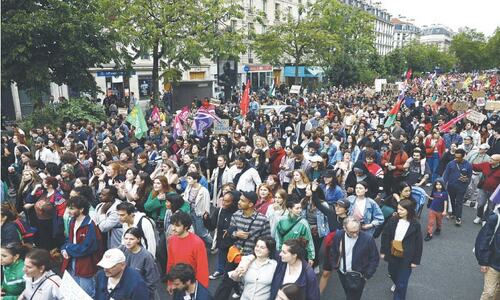MOSCOW, Feb 8: Russia has barred the Guardian’s Moscow correspondent from the country, the British daily said on Tuesday, in a Cold War-style expulsion possibly linked to his involvement in the WikiLeaks cables.
Russian officials remained tight-lipped on the reason for the expulsion of Luke Harding but reports said that a branch of the Russian security services had specifically demanded that the journalist be banned from entering Russia.
Harding flew back to the Russian capital at the weekend after two months in London reporting on the contents of the US cables, given to his paper by the whistleblowing website WikiLeaks.
But he was refused entry when his passport was checked on arrival and after 45 minutes in an airport cell was sent back to Britain on the next available plane, according to the Guardian.
Guardian editor-in-chief Alan Rusbridger said that “this is clearly a very troubling development with serious implications for press freedom.” “Russia’s treatment of journalists — both domestic and foreign — is a cause of great concern,” he added in a statement released by the newspaper.
“Harding was not allowed to enter Russian territory on the demand of one of the Russian (security) structures,” a security source told the state-run RIA Novosti agency, saying his name was on a list of undesirable persons.
The source did not specify further but the comment indicated the demand may have come from the Foreign Intelligence Service (SVR) or the Federal Security Service (FSB).
The Russian foreign ministry has yet to give an explanation for the expulsion, which the Guardian said is believed to be the first removal of a British staff journalist from the country since the end of the Cold War.
A spokesman for Russia’s federal migration service told the Interfax news agency that his organisation had nothing to do with the expulsion.
Meanwhile a source in the FSB declined to give specific comment to the agency but added: “A foreign citizen can be refused entry to the Russian Federation without explanation.” The head of President Dmitry Medvedev’s human rights council, Mikhail Fedotov, said that such cases were “extremely rare” and the advisory body would try to help the newspaper if approached.
“There have to be some very serious reasons to stop a journalist from entering the country,” he told RIA Novosti. The human rights council “always tries to help journalists in such situations.” Foreign Secretary William Hague has telephoned the Russian foreign ministry to seek an explanation for Harding’s expulsion but as yet has received no response, the Foreign Office said.—AFP













































Dear visitor, the comments section is undergoing an overhaul and will return soon.